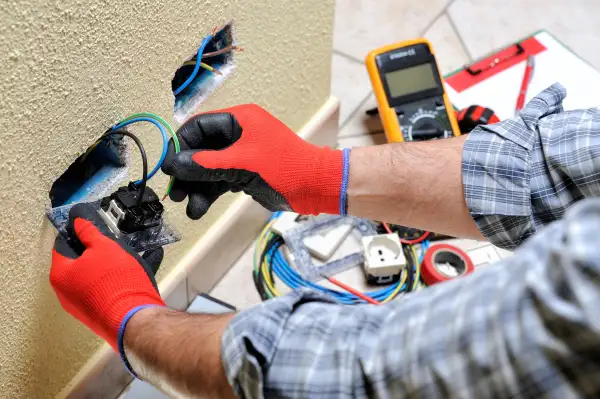Best Paying Jobs In Public Utilities

*Content includes branded mentions of our sponsor ZipRecruiter.
The public utility sector faces a promising future because industry trends are shaping the way we use and access energy. Technological advancements, such as renewable energy solutions and smarter grids, are transforming the sector into a more sustainable and cost-effective model of energy production.
As these continue to develop, the job market in public utilities will further expand, offering increased opportunities for those looking for high-paying jobs in this field, with the highest salaries reaching just over $100,000 a year, according to ZipRecruiter. Here’s an overview of the types of available jobs and what to expect in terms of salary.
Our Top 7 Picks for the Best Paying Jobs in Public Utilities
Given the current skilled workforce shortage in the public utility sector, careers in this field generally attract decent wages. But if you’re looking to make a more substantial salary, you need to know where to look. Here are our top seven picks for the best paying jobs in public utilities.
- Pipeline controller
- Nuclear licensing engineer
- Energy auditor
- Water superintendent
- Electrical engineer
- Power system dispatcher
- Civil engineer
Pipeline controller
A pipeline controller is a professional with a specialized role that involves overseeing utility companies' pipelines and related assets. Pipeline controllers monitor and ensure safety, performance, compliance and integrity in all activities associated with pipeline operation. They're instrumental in protecting both natural resources and public safety.
On a day-to-day basis, pipeline controllers use systems to monitor pressure, flow and other parameters in pipelines. They regularly inspect, test and maintain the pipelines to avoid any abnormalities or leaks. Pipeline controllers also analyze data to detect any irregularities or changes that could lead to safety issues or increased risk. They collaborate with a wide range of stakeholders, such as engineers, customers, local governments, regulators and other utility professionals.
According to the U.S. Bureau of Labor Statistics, the average salary for pipeline controllers is $80,550.
Nuclear licensing engineer
A nuclear licensing engineer specializes in the safety, operation and compliance of nuclear power plants. They must have a thorough understanding of industry regulations and principles to ensure the safety and efficiency of nuclear facilities.
Nuclear licensing engineers evaluate nuclear power plant designs for compliance with applicable regulations and standards. They work with personnel to make sure that any operational changes are compliant with safety and security guidelines. Nuclear licensing engineers also develop licensing plans for the regulation of nuclear reactor operations, radiation sources or special nuclear materials. Moreover, they inspect equipment and document activities in accordance with regulatory requirements and monitor performance to meet safety and operational targets.
The average salary for nuclear licensing engineers is $120,380 per year, making it one of the highest paying roles in the public utility sector.
Energy auditor
Energy auditors are experts in energy efficiency and conservation. They specialize in assessing residential and commercial buildings to determine how much energy they consume and what can be improved to achieve greater efficiency.
Energy auditors visit a site to inspect the building layout, measure the size of the premises, analyze utility bills, assess insulation levels and review any other relevant information. Then they create detailed reports with their findings and recommendations. They also offer guidance on changes that could be made to reduce energy consumption and save money.
The average salary for energy auditors is $60,495 per year. However, salaries may vary depending on the type of company, level of education and experience.
Water superintendent
A water superintendent specializes in the operation, maintenance and management of public water systems. They oversee all aspects of a water system, including pumping, monitoring, testing and distribution. Water superintendents must ensure that the system meets all federal and state regulations related to health and safety.
Each day, water superintendents monitor water quality, system operations and maintenance. They review reports from operators and technicians to identify any issues or irregularities. They also develop operational plans, budgets, personnel schedules and emergency response protocols. Additionally, they supervise staff and implement policies for the safe operation of the system.
Water superintendents earn an average salary of $47,880 per year.
Electrical engineer
An electrical engineer specializes in the design, installation and maintenance of electrical systems. They must have a thorough understanding of electricity, electronic components and circuit architecture to develop safe and innovative solutions for community use.
Electrical engineers are responsible for designing complex electrical systems, such as power grids, motors and communication systems. They perform calculations and simulations to identify potential problems and develop solutions. They also inspect electrical equipment to ensure that it meets safety standards, prepare technical drawings and evaluate system performance. Electrical engineers may be involved in the testing and maintenance of existing electrical systems.
The potential salary for people with expertise in electrical engineering can reach soaring heights. As of May 2021, the median annual wage was an impressive $100,420. Advanced qualifications and experience bring even more opportunities for financial success.
Power system dispatcher
Power system dispatchers are responsible for the operation and control of electric power systems in the public utility sector. They monitor the operation of electrical equipment, such as transformers, circuit breakers and capacitors, to ensure proper operation and maintain optimal system performance.
The daily responsibilities of power system dispatchers include analyzing data from monitoring systems to identify any potential problems. They also review operation plans and schedules to ensure they are being followed correctly. They communicate with power plants, transmission line operators and other system controllers to coordinate the operation of the system, and they respond quickly to emergencies and keep records of operation activities.
If you have the necessary qualifications and experience, you can net a remarkable salary in this position. The mean annual wage for power system dispatchers in 2021 was $95,520.
Civil engineer
Civil engineers are the masterminds behind constructing safe, efficient and cost-effective structures such as roads, bridges, buildings and water systems.
Civil engineers usually create project layouts with CAD (computer-aided design) software, testing and analyzing soil composition and topography to guarantee the structure's stability. They also evaluate existing structures to identify any potential issues before they become serious. Lastly, civil engineers design construction plans and specifications for contractors and monitor their progress during the development stages of a project until its successful completion.
In May 2021, the median yearly compensation for civil engineers was $88,050.
Best Paying Jobs in Public Utilities Guide
For many people, one of the main reasons to leave a job is in search of better pay. When you join an industry, whether it’s in the public utility sector or not, it's important to have as much information as possible so you can make an informed decision.
What is a public utility?
Public utility is a term used to describe goods or services that are considered essential for everyday life. Some examples of public utilities are electricity, water, telecommunications and transport services.
Public utilities are provided by public companies that are regulated by public authorities, such as a public utility commission or board of public utilities. The purpose of these public organizations is to ensure that consumers receive reliable and safe public services at reasonable prices.
The public utility sector operates mainly through public–private partnerships in which public authorities provide regulation and oversight, and private entities are responsible for operations, investments and service delivery. The public utility commission develops rules and regulations that protect public consumers from unreasonable costs and substandard service quality. Moreover, these public organizations ensure that public utility prices remain competitive.
Public utility services provide citizens with access to basic services such as electricity, water and telecommunications that they wouldn't be able to afford on their own. The public utility sector also plays an important role in fostering economic development by providing reliable and affordable services that help businesses grow.
Types of public utilities jobs
Public utility jobs can be divided into two main categories: operations and management. Operations jobs provide people access to public utilities. This includes anything from engineers, water technicians and electric lineworkers to customer service representatives.
Management jobs involve overseeing the process of delivering public utility services, including planning and budgeting for resources, developing policies and making sure the public utility services are meeting customers' needs. Public utility commission jobs and board of public utility jobs fall into this category.
Requirements for a public utilities job
Most jobs in the public utility sector require highly trained professionals who adhere to strict safety regulations and procedures in order to complete their tasks effectively and efficiently. A job in this sector requires a specialized set of skills, knowledge and qualifications.
For many public utility positions, applicants must possess a high school diploma or its equivalent. A relevant bachelor's degree in engineering or another related field of study is also helpful, as it provides applicants with the necessary skills and knowledge to properly diagnose and repair equipment. Some positions may also require a degree in safety compliance.
In addition to formal qualifications, employers may look for evidence of practical experience in the field, via internships or specialized work experience. Candidates should also demonstrate a good understanding of all relevant safety regulations, hazard identification procedures and industry standards.
How to find the highest paying jobs in public utilities
Landing jobs that pay the best in the public utility sector requires a combination of experience, qualifications and research. Here are some tips to help job seekers get the best paid jobs in this field:
Network and build relationships
Networking and building professional relationships with people already working in the public utility sector can help job seekers gain insight into how to best position themselves for interviews. It also provides opportunities to learn about available jobs before they're advertised publicly. And for those interested in finding out how much a job pays before committing to an application, networking can be a great way to gather this information.
Develop the necessary skills and qualifications
To land high-paying jobs in the public utility sector, you must have the relevant qualifications and technical knowledge required by employers. Taking courses related to safety compliance, engineering or customer service can help job seekers acquire the knowledge needed to confidently apply for available positions. When you write a cover letter for a job and send a resume, recruiters will want to know how your qualifications and experience have prepared you specifically for that role.
Utilize job search sites
The internet is a great resource for finding the highest paying jobs in public utilities or in any other industry, really. There are numerous job search sites, such as ZipRecruiter, tailored to specific industries, such as those related to engineering or customer service. Searching for positions in this sector and applying to any that match your skills and qualifications can increase your chances of finding a job that pays well. Many of these sites also have useful resources that can help job seekers learn how to prepare for an interview, so you can nail it and land the job.
Best Paying Jobs in Public Utilities FAQ
How much do public utilities jobs pay?
How stable is a public utilities job?
Is a job in the public utility industry a good career path?
How We Chose the Best Paying Jobs in Public Utilities
To arrive at our list of the seven best paying jobs in the public utility industry, we used salary data from the U.S. Bureau of Labor Statistics. We cross-referenced this information with the skill sets required to ensure each job is suitable for entry-level applicants. We also considered job satisfaction ratings and growth potential when compiling our list so that readers can make an informed decision about which path to pursue.
Summary of Money's Best Paying Jobs in Public Utilities
- Pipeline controller
- Nuclear licensing engineer
- Energy auditor
- Water superintendent
- Electrical engineer
- Power system dispatcher
- Civil engineer


